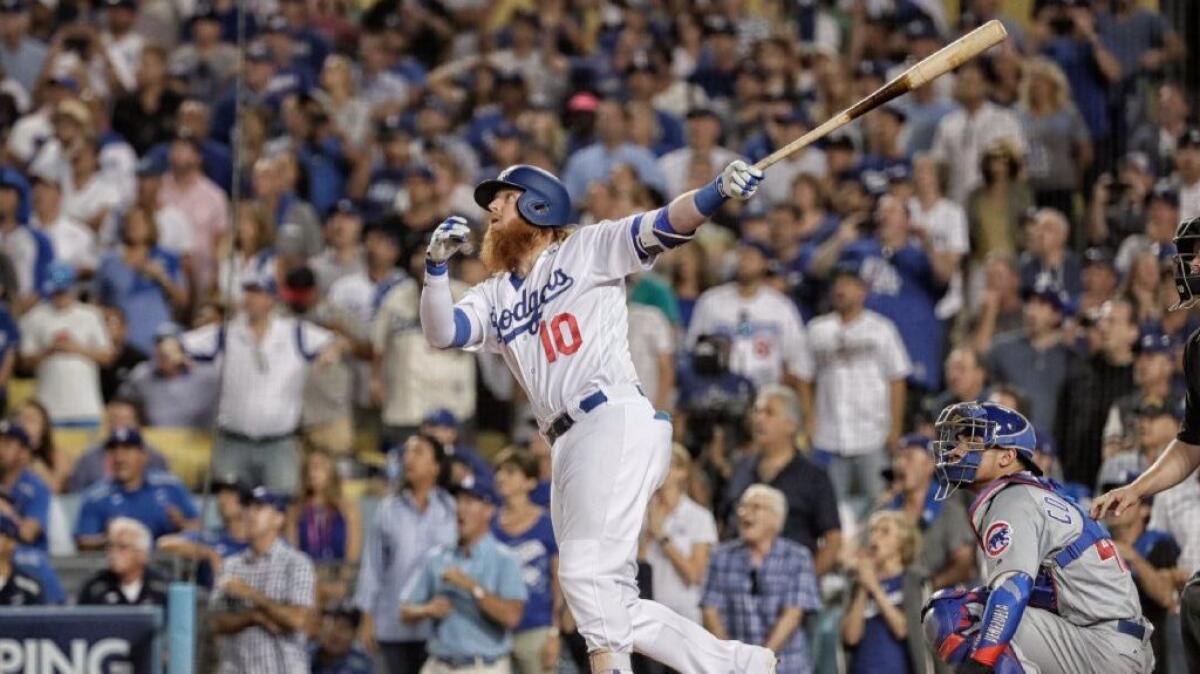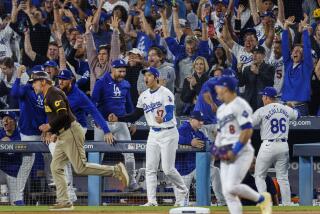Vin Scully talks about Justin Turner’s home run, and watching rather than working the playoffs

- Share via
In this first season of the rest of his life, Vin Scully watched the ball take flight on television Sunday night, from the comfort of his home. The center fielder went back, back, back …
No, of course not. Scully never did resort to a signature line, or a sickly sweet phrase he had dreamed up a day or two in advance.
Justin Turner had hit the Dodgers’ most famous home run since Kirk Gibson, and just about every baseball-loving citizen in Southern California had embraced the precious symmetry in the date — except, that is, the man whose call of Gibson’s home run had been replayed all day, all around town.
“I didn’t realize that was the 29th anniversary of Kirk’s home run,” Scully said Monday. “That never dawned on me.”
On Oct. 15, 1988, Gibson hit the home run that inspired a generation, the hobbled hero shooting a fatal arrow into the heart of the Goliath Athletics.
Amid the bedlam at Dodger Stadium that night, Scully spoke three simple words: “She is … gone!” It was not until after 70 seconds of crowd noise that the best broadcaster in baseball history returned to the microphone with these now-legendary words: “In a year that has been so improbable, the impossible has happened!”
On Oct. 15, 2017, Turner hit the Dodgers’ first postseason walkoff home run since Gibson, driving the Dodger Stadium crowd into mass delirium and putting the home team within two victories of its first World Series since Gibson. How might Scully have called Turner’s home run?
“I wouldn’t have said much,” he said. “I would have just said, as always, ‘It’s gone,’ and then shut up.”
And then Scully chuckled.
“I do my best work saying nothing,” he said.
Scully turns 90 next month. He retired last year. He said he is grateful that the Dodgers have invited him and his wife, Sandi, to watch this year’s playoff games from a suite. The couple leaves early to avoid having to navigate the traffic in the concourses and on the freeways, and to make sure to get home in time to see the end of the game.
After 67 years as the voice of the Dodgers, his seat in the suite is something new, and about 15 feet to the left.
“I’m looking at a game sideways,” he said. “My entire life, I would look at a game from behind home plate.
“Only once in all of my career, that I can think of, did I ever broadcast sitting sideways to the game. That was a thousand years ago, at Forbes Field in Pittsburgh. They used to put the visiting announcers in a different place every time we would come to Pittsburgh. One time, they put us in an auxiliary scoreboard, down past third base.
“The biggest difference for me is, I can’t quite judge things. I can’t tell whether the pitcher has good stuff. When the pitcher releases the ball, I’m looking at the visiting dugout and the stands, so you really almost lose the sight of the ball for a fraction of a millisecond.
“Then balls are hit in the gap, and you have to wait to see who might catch it. There have been a couple of scary plays — the [Cubs’ Albert] Almora catch in Game 2, when he was looking up into that bright sun and made a great catch going into the wall, and then the other fly ball to deep right-center, where it looked like [the Dodgers’ Chris] Taylor and [Yasiel] Puig would collide. I would be able to judge that so much better sitting behind home plate, in the broadcast booth.
“That’s the biggest difference: I’m looking at the game sideways.”
Scully was so objective in his broadcasts, telling his audience how and why the Dodgers made a poor play rather than trying to explain it away, that fans might have perceived he did not care if the Dodgers won.
He might not have let his feelings overtake his professionalism, but he says he was rooting for the Dodgers all those years behind the microphone, and he is rooting for them today.
“I’m not emotional,” he said. “I don’t jump up on a home run, or anything like that at all.
“But I don’t think it’s any secret that, when you work for a ballclub, you want the club to win. You know all the personnel — the manager, the coaches, all the ownership.
“Sure, I would like to see the Dodgers win. I want them to win. I was able to enjoy ’88, so why not watch others enjoy it this year?”
Follow Bill Shaikin on Twitter @BillShaikin
ALSO
Judge’s offense and defense help lift Yankees in ALCS Game 3
The Dodgers’ bullpen has the confidence to be dangerous for the Cubs
Back-to-back games for Kenta Maeda? No problem, Dodgers say
More to Read
Go beyond the scoreboard
Get the latest on L.A.'s teams in the daily Sports Report newsletter.
You may occasionally receive promotional content from the Los Angeles Times.











